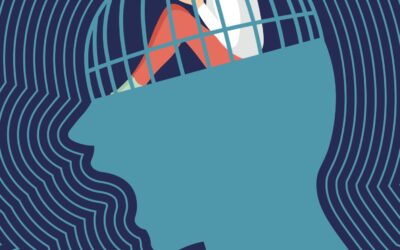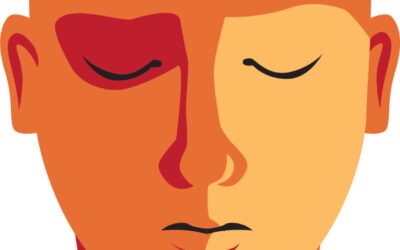
Cognitive distortions or faulty thinking patterns are unnecessary or irrational thought habits. These negative thought patterns can contribute to issues like anxiety, sadness, and substance abuse as well as decrease your motivation and self-esteem. Cognitive distortions are ideas that lead people to have incorrect perceptions of reality.
They are, in essence, recurring errors of thought. When you have a cognitive distortion, your interpretation of events is typically biased against you. Most people occasionally experience cognitive distortions. But if they are repeated enough times, they can worsen depression, exacerbate anxiety, wreak havoc on relationships, and a whole lot of other problems.
Cognitive distortions are a coping mechanism that people use to deal with stressful life situations. One or more cognitive distortions are more likely to develop the longer and more severe those unwanted events are. One early theory even speculates that cognitive distortions may have evolved in humans as a form of evolutionary survival strategy.
To put it another way, stress may lead individuals to change their thinking in ways that are advantageous to their immediate survival. However, these ideas aren’t long-term logical or healthy.
A few examples include – I have the worst luck in the entire world is one example.
I recently failed the chemistry exam. I should probably drop out of school because I’m bad at it.
She must have experienced a dreadful event because she arrived so late to the tournament.
Types of cognitive distortions
There are a few common cognitive distortions that are identified by therapists during their therapeutic sessions. All of them are equally concerning in nature depending on the severity. here are a few of those cognitive distortions mentioned with explanations for a better understanding –
- All or nothing thinking
Black and white or polarized thinking are other names for all-or-nothing thinking. When thinking in this perspective, everything is seen as being either absolutely true or false, excellent or bad, successful or unsuccessful.
This way of thinking is problematic because it leaves no opportunity for acceptance of anything in-between the two extremes. It may make it difficult for you to stick with long-term goals and may lower your motivation and confidence. For instance, rather than maintaining a healthy eating regimen, you might give up and declare yourself a failure each time you stray from it.
- Overgeneralization
Overgeneralizing causes some pretty serious thinking errors because it is a cognitive distortion, or distorted way of thinking that makes you generalize the same type of situation whit the same results. Overgeneralizing is defined as making a large assumption about something based on a little body of knowledge.
There are numerous ways to overgeneralize. If we interview for a job and don’t get it, we may overgeneralize and believe we’ll never get a job, which makes us feel gloomy. This is an example of how we might predict the outcome of something based on just one occurrence of it. The issue with this way of thinking is that it ignores situational variations and the potential impact of chance or luck.
- Mental Filter
The mental filter acts as a mental screen that lets the bad features of a situation pass through while obscuring the good ones. You tend to focus more on negatives than positives because of the mental filter. As a result, you might gradually form the natural habit of focusing on the negative more frequently, rapidly, and readily.
Focusing on the bad can quickly develop into having a pessimistic or generally negative attitude on life. Unpleasant feelings like sadness, disappointment, wrath, worry, fear, and other negative emotions might arise when you give the negative attention it deserves. It may end up making you feel much worse about the situation.
- Magnification
When something is magnified, a person will consider it to be much more significant than it actually is. In this instance, the significance of an occurrence, especially one that is seen negatively, like an error, is overstated.
For instance, a spilt glass of milk becomes much more than just a minor inconvenience. Magnification frequently happens under negative circumstances, such as mistakes one has done or that others have made in their life, accidents that happen, social faux pas, etc. We all experience this to some level; a serious social blunder will cause us to feel uncomfortable even if our peers don’t seem to care.
- Emotional reasoning
A cognitive bias known as emotional reasoning involves making incorrect judgments about your situation, your circumstances, and the people you contact with. For instance, if you are anxious, you can wrongly believe that a negative or harmful event might happen or that you won’t be able to handle a potential consequence.
When depressed, it’s possible to mistakenly believe that you are useless, your life is miserable, and there is no hope for the future. Even though there may frequently be valid grounds for feeling the way you do, emotional reasoning frequently serves as a cognitive distortion. The explanation is that our emotional intensity is frequently disproportionate to the available evidence.
- Labelling
Labeling is a cognitive error in which we infer from a single attribute of a person to that person as a whole. For example, I am a failure since I didn’t pass a test or she’s reckless since she routinely arrives late to work. When someone is labelled as arrogant, for example, we tend to see them as a whole and ignore any facts that doesn’t fall inside the label’s definition. As a result, we trust the label more and feel that it more accurately describes the person.
Labeling is a cognitive error that can maintain painful feelings by creating incorrect thinking in addition to labelling. You could experience grief, despair, hopelessness, etc. if you fail an exam and believe that this signifies you’re a failure. While learning that you only failed an exam would definitely leave you feeling more mildly disappointed.
- Discounting the positive
A cognitive bias called discounting the positive entails disregarding or discrediting pleasant things that have happened to you. Similar to mental filtering, but you are intentionally rejecting the positives as opposed to just ignoring them. For instance, Noah completes a project and is recognized for his excellent work with a prize. Instead of taking pride in his accomplishment, he dismisses it as the result of pure luck that had nothing to do with his skill or work.
People who engage in this cognitive distortion consider fortunate situations to be coincidences. They never anticipate these positives to occur again since they are always viewed as anomalies. This way of thinking is problematic because it makes you doubt your own talents.
Therapy to deal with cognitive distortions
Online counselling and Therapy by professional Psychotherapist use the therapeutic practice of cognitive restructuring, also known as cognitive reframing, assists the client in identifying, challenging, and changing or replacing their unfavorable, illogical views. Given that many of our issues are a result of incorrect ways of thinking about ourselves and the environment, it is a cornerstone of cognitive behavioral therapy and a commonly employed technique in a therapist’s toolkit. Through the development of more constructive and useful thought patterns, cognitive restructuring attempts to assist people in reducing their stress.
Fortunately, there are techniques to fight cognitive distortions, despite the fact that they are persistent and very sneaky thought processes, the identification, testing, and replacement of inaccurate methods of thinking with more precise, beneficial, and positive ways of thinking have been very successful uses of cognitive restructuring approaches.
A few techniques including guided imagery, Socratic questioning, thought records, non-catastrophizing or what-if technique, etc are used to challenge negative and faulty patterns of thinking in a controlled environment with a therapist.
Conclusion
Cognitive distortions are false beliefs that present themselves as unquestionable realities. These incorrect ideas are frequently employed to support unfavorable opinions or feelings. These distortions have a variety of root causes, many of which originated as inflexible and fixed adult coping mechanisms for childhood trauma. A fundamental and important aim of psychotherapy is to alter these distortions. If we have inaccurate assumptions about our own behavior and the motivations of others, we are unavoidably viewing reality with a gravely warped perspective.
The mind uses cognitive distortions to deceive us and persuade us of things that are just untrue. Even though many cognitive distortions are prevalent, some of them can be warning signs of more severe conditions and negatively impact mental health, escalating signs of stress, worry, or depression.
Speak with your Online Therapist or Counselling psychologist if you believe that cognitive distortions may be impacting your perception of reality and are worried about how these beliefs may be adversely affecting your life. You can learn to think more accurately and helpfully with the use of therapies like cognitive behavioral therapy.
According to Earl Nightingale, “we become what we think about.” This claim has inspired numerous self-help and peak productivity philosophies, but it also has a real-world application in reducing anxiety and depression since we do, in fact, become what we think about. The natural conclusion is that we will experience depression and/or anxiety if our thinking is excessively pessimistic, negative, nasty from the inside out, or self-critical.
3 Effective ways to heal an eating disorder
Eating disorders are dangerous conditions caused by recurrent eating patterns that have an adverse effect on your health, your moods, and your capacity to carry out essential life functions. The majority of eating disorders are characterized by an unhealthy obsession...
Understanding Depression and Effective ways to Heal
A persistent sense of emptiness, sorrow or an inability to experience the pleasure that may seem to occur for no apparent reason is known as depression. It is quite different from general sadness or grief as it lingers on for a prolonged period of time. It may result...
7 Red Flags you have been Gaslighted
The phrase "gaslighting" originates from a 1938 play by Patrick Hamilton called "Angel Street" in America, which Alfred Hitchcock later turned into the movie "Gas Light." In the thriller movie, a cunning spouse tries to make his wife believe she is going crazy by...
How to Deal with Body Image Issues
Body image is a person's perception of their physical appearance and their level of attractiveness. Concerns regarding one's body image are common. These worries frequently centre on one's weight, skin, hair, or the size or shape of a certain bodily part. But our...
How to deal with Irrational Fears
Some individuals may find the word "irrational" insulting. In light of the fact that the fear seems to be extremely real, there may possibly be a valid basis for it. But depending on how it controls your life, even a reasonable fear might be irrational. Most people...
Intrusive Thoughts – Knowing the Causes, Types, and Treatment
What are intrusive thoughts? Ever been in a normal social setting like your classroom or office, and suddenly an unwanted thought or image pops up that makes no sense? In most cases, you overlook these thoughts and continue with your day, but some of them become...






